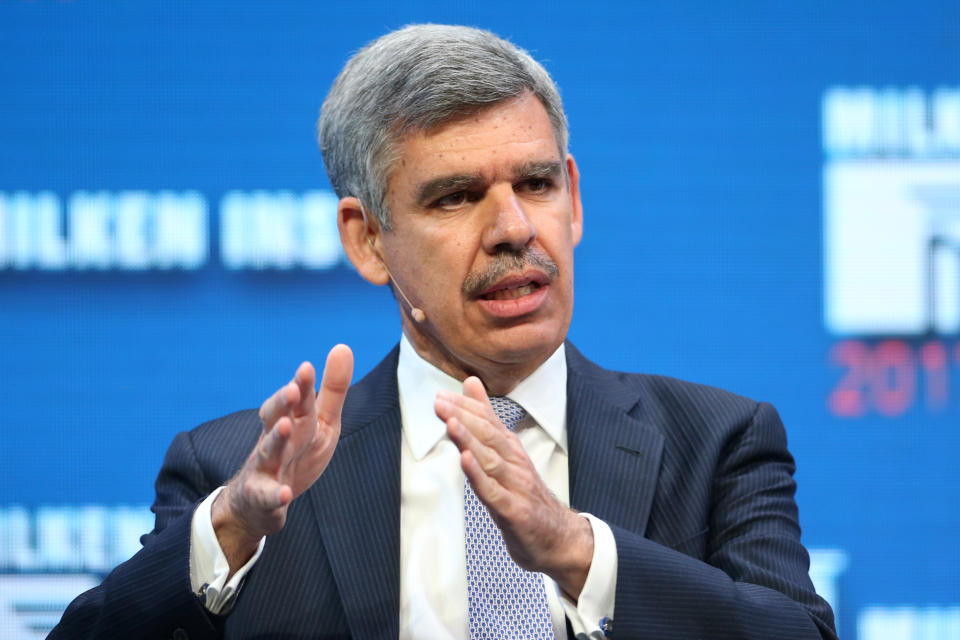El-Erian: Markets believe two things very strongly right now
Even as uncertainties flare over when and how Iran will retaliate after a U.S. airstrike took out one of its top military commanders, markets have taken hold of two grounding principles, according to Mohamed El-Erian.
“The market losses are less than what they were initially and that reflects the deep conditioning that investors have had,” El-Erian, chief economic advisor at Allianz, said during Yahoo Finance’s The Final Round. “It’s not to say that there hasn’t been an escalation of tensions. There has been, and we are likely to get some sort of retaliation.”
“But markets believe two things very strong,” he added. “One, that this will not be a full-scale war. And secondly that the Fed is on the sidelines and will intervene if there’s too much market volatility.”
Late Thursday, the U.S. Department of Defense confirmed that Qassem Soleimani, head of Iran’s Islamic Revolution Guard Corps’ Quds Force, was killed during an airstrike in Baghdad ordered by President Donald Trump, according to a statement. Iran’s Supreme Leader Ayatollah Ali Khamenei vowed to inflict “severe retaliation” on those involved in Soleimani’s death, according to a statement cited by media.
The initial market pullback could have been bigger
The market reaction to the announcement was swift, if not long-lasting in its magnitude. During Friday’s session, the Dow recovered from losses of as many as 368.4 points to close lower by 226.1 points. The S&P 500 was off by just 0.7% as of Friday’s settlement, after declining by more than 1% at the lows of the session.
And internationally sensitive Brent crude oil prices pared sharp gains, after earlier reaching the highest level since September. The commodity dipped back below $69 per barrel by Friday afternoon, even as some analysts warned of potential supply disruptions as Iran, an OPEC member and major global oil producer, weighed retaliation.
“I think both of us would have said the initial pullback was going to be bigger than it has been,” El-Erian told Yahoo Finance. “And what actually transpired tells you that investors have been conditioned over and over again to buy the dip. They’ve been conditioned not to extrapolate geopolitical or political shocks. And that has served them extremely well. You’ve made a ton of money by following that strategy.”

“So you need a major escalation to get people out of this condition, otherwise it’s going to prevail,” he added.
At the same time, the Federal Reserve has also been a pillar of markets’ resilience, El-Erian said. As he sees it, U.S. stocks’ relatively expensive valuations remain justified “because of favorable market technicals that are fueled by enormous market liquidity.”
“There’s been an over $600 billion expansion in the Fed’s balance sheet in the last four months,” El-Erian said, referring to the Fed’s decision late last year to re-start making large-scale asset purchases to keep financial markets running smoothly. “That’s a very big number. They don’t call it QE (quantitative easing), but in terms of its impact on asset prices, it has a QE impact. Add to that the ECB (European Central Bank) – it is very hard not to be constructive short-term. However, the medium-term uncertainties are increasing. Today is another example of that.”
And the medium-term, El-Erian said, is the horizon on which investors should be most prudent.
“My worry –and I keep on saying that – is don’t ignore the mounting medium-term uncertainties,” El-Erian said. “So yes, keep a claim on the upside, but do it in a selective manner that also acknowledges that we are facing more and more uncertainties that are going to play out in the next few years.”
—
Emily McCormick is a reporter for Yahoo Finance. Follow her on Twitter: @emily_mcck
Read more from Emily:
Follow Yahoo Finance on Twitter, Facebook, Instagram, Flipboard, LinkedIn, and reddit.
Find live stock market quotes and the latest business and finance news

 Yahoo Finance
Yahoo Finance 